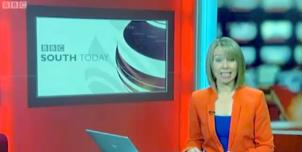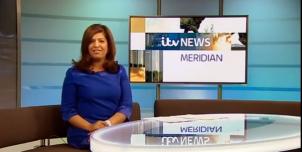Full Freeview on the Oxford (Oxfordshire, England) transmitter
| Google Streetview | Google map | Bing map | Google Earth | 51.790,-1.179 or 51°47'25"N 1°10'46"W | OX3 9SS |
The symbol shows the location of the Oxford (Oxfordshire, England) transmitter which serves 410,000 homes. The bright green areas shown where the signal from this transmitter is strong, dark green areas are poorer signals. Those parts shown in yellow may have interference on the same frequency from other masts.
This transmitter has no current reported problems
The BBC and Digital UK report there are no faults or engineering work on the Oxford (Oxfordshire, England) transmitter._______
Digital television services are broadcast on a multiplexes (or Mux) where many stations occupy a single broadcast frequency, as shown below.
64QAM 8K 3/4 27.1Mb/s DVB-T MPEG2
DTG-12 QSPK 8K 3/4 8.0Mb/s DVB-T MPEG2
H/V: aerial position (horizontal or vertical)
Which Freeview channels does the Oxford transmitter broadcast?
If you have any kind of Freeview fault, follow this Freeview reset procedure first.Digital television services are broadcast on a multiplexes (or Mux) where many stations occupy a single broadcast frequency, as shown below.
64QAM 8K 3/4 27.1Mb/s DVB-T MPEG2
DTG-12 QSPK 8K 3/4 8.0Mb/s DVB-T MPEG2
H/V: aerial position (horizontal or vertical)
Which BBC and ITV regional news can I watch from the Oxford transmitter?

BBC South (Oxford) Today 0.4m homes 1.6%
from Oxford OX2 7DW, 6km west-southwest (258°)
to BBC South (Oxford) region - 6 masts.
BBC South (Oxford) Today shares 50% content with Southampton service

ITV Meridian News 0.9m homes 3.4%
from Whiteley PO15 7AD, 102km south (182°)
to ITV Meridian/Central (Thames Valley) region - 15 masts.
Thames Valley opt-out from Meridian (South). All of lunch, weekend and 50% evening news is shared with all of Meridian+Oxford
How will the Oxford (Oxfordshire, England) transmission frequencies change over time?
| 1950s-80s | 1984-97 | 1997-98 | 1998-2011 | 2011-13 | 2013-18 | 2013-17 | 23 May 2018 | ||
| VHF | C/D E | C/D E | C/D E | C/D E | C/D E T | W T | W T | ||
| C2 | BBCtvwaves | ||||||||
| C29 | SDN | ||||||||
| C31 | com7 | com7 | |||||||
| C37 | com8 | com8 | |||||||
| C41 | BBCA | ||||||||
| C44 | D3+4 | ||||||||
| C46 | _local | ||||||||
| C47 | BBCB | ||||||||
| C49tv_off | C5waves | C5waves | |||||||
| C50tv_off | SDN | SDN | |||||||
| C51tv_off | LOX | LOX | |||||||
| C53tv_off | C4waves | C4waves | C4waves | +BBCA | +BBCA | +BBCA | |||
| C55tv_off | ArqB | ArqB | ArqB | com7tv_off | |||||
| C56tv_off | COM8tv_off | ||||||||
| C57tv_off | BBC1waves | BBC1waves | BBC1waves | BBCB | BBCB | BBCB | |||
| C59tv_off | -ArqA | -ArqA | -ArqA | ||||||
| C60tv_off | ITVwaves | ITVwaves | ITVwaves | -D3+4 | -D3+4 | -D3+4 | |||
| C62 | SDN | ||||||||
| C63 | BBC2waves | BBC2waves | BBC2waves |
tv_off Being removed from Freeview (for 5G use) after November 2020 / June 2022 - more
Table shows multiplexes names see this article;
green background for transmission frequencies
Notes: + and - denote 166kHz offset; aerial group are shown as A B C/D E K W T
waves denotes analogue; digital switchover was 14 Sep 11 and 28 Sep 11.
How do the old analogue and currrent digital signal levels compare?
| Analogue 1-4 | 500kW | |
| BBCA, D3+4, BBCB | (-7dB) 100kW | |
| SDN, ARQA, ARQB | (-10dB) 50kW | |
| Analogue 5 | (-11dB) 40kW | |
| com8 | (-14.7dB) 17.1kW | |
| com7 | (-14.8dB) 16.4kW | |
| Mux 1*, Mux 2*, LOX | (-17dB) 10kW | |
| Mux C*, Mux D* | (-18dB) 8kW | |
| Mux A*, Mux B* | (-19.2dB) 6kW |
Which companies have run the Channel 3 services in the Oxford transmitter area
|
|
Monday, 17 October 2011
A
Adam B5:29 PM
Dunstable
Spartan:
Your suspicions are correct, the box cannot see HD transmissions.
Hope this helps,
Adam.
| link to this comment |
Adam's: mapA's Freeview map terrainA's terrain plot wavesA's frequency data A's Freeview Detailed Coverage
J
jb385:33 PM
Spartan: Yes, you are quite correct, as that box is not fitted with a DVB-T2 tuner which is necessary for HD reception, the DVB-T tuner as is fitted in your box just ignoring HD signals.
| link to this comment |
J
jb385:36 PM
Adam B: Duplicate posting not intentional Adam, didnt notice you had replied!
| link to this comment |
S
Susan8:02 PM
For several days the reception in our part of Headington for ITV3 has been lost- I retuned a digital tv today and am down to 80 channels from over 100 after the switchover in September. Is there anything else I should be considering ?( I have my Father on at me from time to time).
| link to this comment |
Tuesday, 18 October 2011
A
Algernon Black8:32 PM
I note from the web page of Digital UK (www.digitaluk.co.uk) that from 2012 the transmissions from Oxford will deteriorate.
I have taken up this matter with Digital UK and they replied:-
""Our postcode checker does suggest that you may receive a good overall reception on around 18 channels and a variable reception on around 48 channels in 2012.""
Surely this is totally unacceptable.
Algy
| link to this comment |
M
Mike Dimmick11:13 PM
Algernon Black: Because the switchover programme is still in progress, a later change at another transmitter can affect some viewers. If they'd switched everything over in one go, this wouldn't have happened - and you'd never have noticed.
Most likely you're in the south or south-east of the coverage area, near High Wycombe, Assendon or Chisbury. Those three transmitters' PSB multiplexes will clash with Oxford's COM multiplexes. The commercial multiplexes are not required to meet any specific level of coverage and certainly not to match the PSB multiplexes, which are required to substantially match analogue coverage.
'Variable' reception in Digital UK's postcode checker does not necessarily mean variable results. It means that using their aerial model, the percentage of locations that should, on average, have reliable performance 99% of the time, is below 70%. It means siting an aerial to get reliable results will be more difficult than if the 'good' standard was met. The aerial model is quite pessimistic, compared to real aerials, regarding rejection of signals from other directions and from the other polarization (those relays will transmit vertically-polarized signals and Oxford uses horizontal polarization).
High Wycombe and Chisbury already use C55/C59/C62 for their analogue transmissions, but a digital service does do more damage to another digital service than an analogue one does. Assendon uses C55 now and will start using C59 and C62 at switchover.
If you do find you are affected, you may be able to fix the problem by rotating the aerial slightly towards or away from the interfering transmitter - real aerials have peaks and troughs in their 'polar response' - how much signal is picked up from different directions - and you may be able to drop the interfering signals into a trough in the response.
| link to this comment |
Wednesday, 19 October 2011
... in addition C62 is going to be reallocated for use by 4G mobile services.
| link to this comment |
M
Mike Dimmick9:01 AM
Briantist: Yes, but that's not yet in the Digital UK postcode checker. If the conclusion is that the interference from those relays doesn't significantly affect that many Oxford viewers, chances are that Oxford and those relays will be moved to the same channels.
Ofcom's latest 'Table of Digital Stations' (version 5) now has High Wycombe and Assendon BBC B, and Chisbury BBC A, using C50 rather than C62 from their DSO dates. So perhaps that isn't the source of interference, or not the whole story.
The next nearest transmitter using the same channels is Midhurst, and of course this is a relatively high-power main transmitter using horizontal polarization. The variable reception prediction may just reflect lift conditions. At present C55 is an analogue channel at Midhurst, C59 and C62 are low-power digital multiplexes.
| link to this comment |
Select more comments
Your comment please





